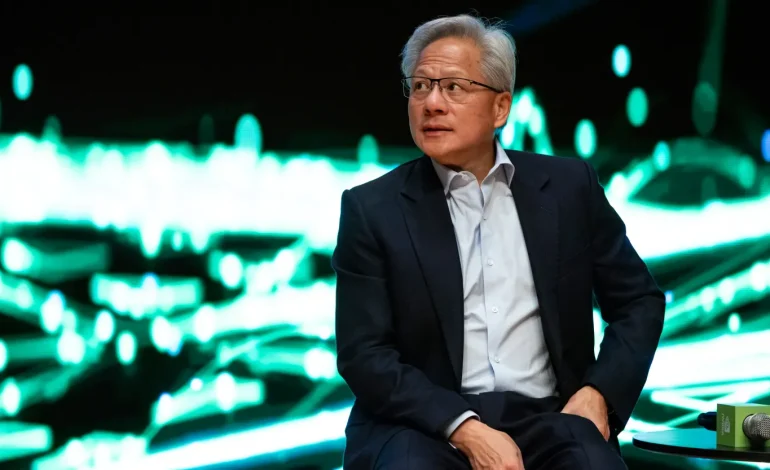With input from CNBC, Bloomberg, Reuters, and Business Insider.
Nvidia’s stock took a hit Tuesday after reports that one of its biggest customers, Meta, is seriously considering shifting part of its future AI chip business to Google.
Shares of Nvidia fell about 4% in premarket trading after The Information reported that Meta is in talks to use Google’s tensor processing units (TPUs) in its data centers starting in 2027, and may even begin renting TPUs from Google Cloud as soon as next year.
While Nvidia is still the undisputed heavyweight of AI hardware, the news rattled investors who’ve gotten used to seeing the company dominate the space almost unchallenged.
Meta is one of the most aggressive spenders in the AI arms race, with capital expenditure for this year expected to land in the $70–$72 billion range, much of it aimed at AI infrastructure. Up until now, Nvidia has been a huge beneficiary of that spending.
If Meta shifts even a slice of that budget to Google’s chips, it’s a big symbolic moment.
According to the report, Meta is weighing two moves:
- Using Google’s TPUs in its own data centers starting in 2027;
- Renting TPUs through Google Cloud as early as next year.
That would mark a potentially major expansion of Google’s chip business. Historically, Google designed TPUs mainly for its own workloads inside Google Cloud. Now it’s trying to convince big customers to adopt them directly in their own data centers too.
“Google Cloud is experiencing accelerating demand for both our custom TPUs and NVIDIA GPUs; we are committed to supporting both, as we have for years,” a Google spokesperson said.
The market reaction was swift.
- Nvidia: Down around 4% premarket, and as much as 6% in regular trading in some sessions;
- Alphabet (Google’s parent): Up more than 4%, building on a strong rally the day before;
- Broadcom, which helps Google design and manufacture its TPUs: Up about 2% premarket after an 11% jump on Monday.
Other chipmakers got caught in the downdraft too:
- AMD: Down as much as 10%;
- Intel, Micron, TSMC: Also lower, dragging the Nasdaq down more than the broader market.
It’s another reminder that in 2025, anything that threatens Nvidia’s seemingly unshakeable position in AI can send shockwaves across the entire chip sector.
Google first launched its TPUs back in 2018, initially just to power its own internal AI and cloud workloads. Since then, it has rolled out more advanced generations designed specifically for training and running large AI models.
Unlike general-purpose GPUs, TPUs are custom chips built from the ground up for AI tasks. That specialization can make them:
- More efficient for certain workloads;
- Highly attractive to big players who are pushing the limits of power, performance, and cost.
Experts say that having its own in-house silicon gives Google a strategic edge: it can optimize everything from hardware to software in one tightly integrated stack, and now it’s trying to turn that into a serious business line.
Winning a deal with Meta would be a huge validation of that strategy — and a direct competitive shot at Nvidia.
Some Google Cloud executives, according to the report, have even floated the idea that TPUs could eventually capture up to 10% of Nvidia’s annual revenue in the AI chip market. That’s billions of dollars.
None of this means Nvidia is about to be dethroned.
Its GPUs remain the backbone of the global AI build-out, and its software ecosystem — especially the CUDA platform — has a nearly 20-year head start. More than 4 million developers rely on CUDA to build AI and other applications, and that kind of moat doesn’t vanish overnight.
Google itself emphasized that it’s not abandoning Nvidia at all — its cloud unit rents out huge fleets of Nvidia GPUs and plans to keep doing so. Even Anthropic, one of the leading AI firms, recently expanded its deal with Google to use up to one million of its AI chips, mixing TPU access with cloud services.
Still, the direction of travel is clear: big AI customers want options.
Companies building massive AI infrastructure — from Meta to Anthropic to countless startups—have all been hunting for a more diversified chip supply. Nvidia’s hardware is powerful, but it’s also:
- Expensive;
- In high demand, leading to supply constraints and long lead times.
That’s opened the door for alternatives:
- Custom chips like Google’s TPUs;
- In-house designs (think Amazon’s Trainium/Inferentia, Meta’s own chip efforts);
- Traditional rivals like AMD trying to claw their way into AI data centers.
Meta’s interest in Google’s chips fits right into that pattern. It’s not about dropping Nvidia entirely; it’s about not being completely dependent on a single supplier for tens of billions in spending.
The stock moves are also happening against a bigger backdrop: constant chatter about whether we’re in an “AI bubble.”
Nvidia has been right in the center of that debate. The company recently posted stronger-than-expected guidance, but tech stocks still sold off afterwards as investors worried about frothy valuations and how long AI-related spending can keep growing at this pace.
Nvidia shares are down from their peak but still up sharply for the year, making the stock a lightning rod for both optimists and skeptics. High-profile investors like Michael Burry of “The Big Short” fame have warned about a broader market bubble, and Nvidia often ends up as Exhibit A in that argument.
Alphabet, meanwhile, has been on a tear — its share price has surged as investors warm to the idea that Google might actually be a major winner in AI, not just scrambling to catch up.
Nvidia is still the top dog in AI hardware. Nothing in this week’s news changes that overnight.
But Meta sniffing around Google’s TPUs sends a clear message:
Big AI players are shopping around, and Nvidia is no longer the only game in town.
For investors, that means a more competitive — and volatile — AI chip landscape. For everyone else, it’s another sign that the AI boom is entering a new phase, where hardware options multiply and the giants of tech start quietly hedging their bets.










The latest news in your social feeds
Subscribe to our social media platforms to stay tuned